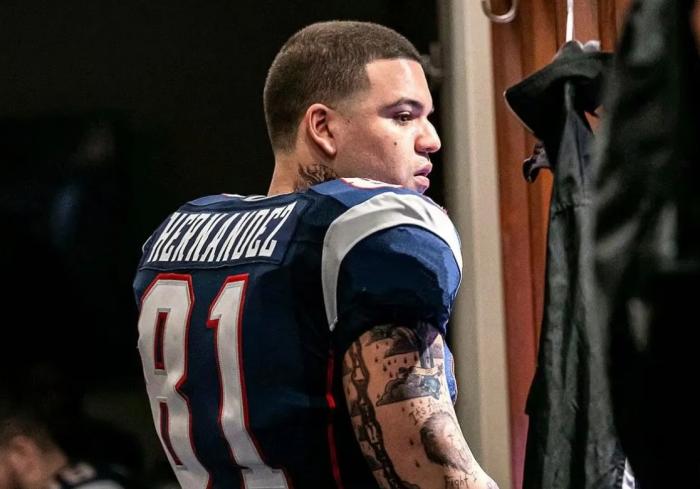Does ‘American Sports Story’ Overemphasize Aaron Hernandez’s Sexuality?

I followed the Aaron Hernandez case about as closely as any NFL fan who wasn’t a Patriots fan. I knew the basics: he was convicted of murdering a close friend and took his own life in his prison cell a few days after being acquitted in a separate trial for double homicide. Once he died, I stopped keeping up with new developments, and I sure as hell didn’t gain any insights from Boston sports talk radio, which distills all the racism and homophobia in Massachusetts into rage bait for the average Boston commuter.
That’s why it was surprising to see Ryan Murphy’s American Sports Story: Aaron Hernandez focus so heavily on Hernandez’s sexuality. In the first two episodes, Hernandez (played by Josh Andrés Rivera) is depicted having secret sexual encounters with a high school boyfriend, experiencing panic over his father or teammates finding out he’s gay, and having both online and real-life hookups while attending the University of Florida. There’s even a scene where he fantasizes about a naked teammate in the locker room.
Given what’s publicly known about Hernandez, is it fair for American Sports Story to zero in on this aspect of his life? To viewers unfamiliar with the case’s details, the emphasis on his sexuality might feel sensational and gratuitous, a hallmark of Ryan Murphy’s style. But it’s worth asking whether this portrayal is based on factual evidence or just tabloid speculation.
The truth is murky. Just days before Hernandez took his life, Boston sports talk radio hosts joked about his sexuality. After his death, Michele McPhee wrote a piece for Newsweek that essentially outed Hernandez, claiming that he was bisexual and suggesting his sexuality was a motive for murder. She even alleged that Hernandez left a suicide note for a prison boyfriend, a claim later debunked when it was revealed the note was actually addressed to his attorney.
This type of reporting could justify the focus of American Sports Story, but it doesn’t give the full picture. The Boston Globe soon reported that gay-rights advocates were disturbed by Newsweek’s coverage, noting that “unverified reports are not relevant to his crimes or his suicide.” The Globe emphasized that there was no third letter to a prison boyfriend, a significant contradiction to McPhee’s claims. A few days later, the New Yorker reached out to the Globe to ask why they didn’t cover what Newsweek had. The response: “We have heard the same rumors as everyone else and have tried to confirm them to the degree they’re relevant to Hernandez’s death, but have not been able to verify that they are based in fact.”
Does this mean the show is exaggerating for dramatic effect? It’s complicated. Hernandez’s brother claimed in his book that although Hernandez never explicitly told him he was gay, he did confide in their mother that he was while in prison. A family attorney, who is gay himself, also said that Hernandez was gay and had confessed as much to his mother and ex-girlfriend. However, he controversially suggested that the sexual abuse Hernandez suffered as a child “caused” him to be gay, a harmful and outdated perspective.
Given these conflicting accounts, there is some basis for American Sports Story to explore Hernandez’s sexuality as a factor in his mental state and actions. But it’s crucial that this focus doesn’t overshadow the more established elements of Hernandez’s story: his violent upbringing, the influence of the people around him, and — most importantly — his severe CTE diagnosis. Football damaged his brain, and many former NFL players suffering from CTE have exhibited violent behavior or taken their own lives. That should be the dominant narrative, not the sexuality of Hernandez.
Sources: Newsweek, Boston Globe, New Yorker, CNN, Radar Online
Related
Here’s how Cadillac can become a true American F1 dream…
Credit: Instagram Cadillac (@cadillac) Cadillac F1 stands to have a huge chance to be an American team by and for Americans, something that Formula 1 so badly
Stephen A. Smith Contract Extension – Work Less, Earn More,…
Stephen A. Smith has just landed the contract of his life with ESPN!
American Athletic Conference becomes first league to set ‘minimum standard’…
The American Athletic Conference approved an initiative on Friday to establish a minimum standard of benefits that schools are required to share with athletes i
American Sports Entertainment Company Announces Strategic Partnership with Seidler Equity…
CHANDLER, Ariz., March 7, 2025 /PRNewswire/ -- American Sports Entertainment Company ("ASEC"),











